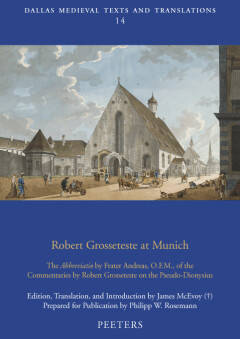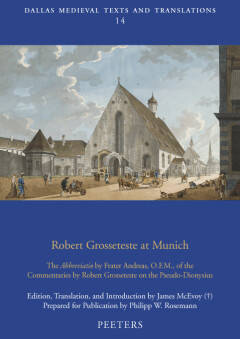
- Afhalen na 1 uur in een winkel met voorraad
- Gratis thuislevering in België vanaf € 30
- Ruim aanbod met 7 miljoen producten
- Afhalen na 1 uur in een winkel met voorraad
- Gratis thuislevering in België vanaf € 30
- Ruim aanbod met 7 miljoen producten
Zoeken
Robert Grosseteste at Munich
The Abbreviatio by Frater Andreas, O.F.M., of the Commentaries by Robert Grosseteste on the Pseudo-Dionysius
J McEvoy, Pw Rosemann
€ 78,95
+ 157 punten
Omschrijving
Robert Grosseteste at Munich contains an edition, translation, and careful study of a short and hitherto completely neglected text from a manuscript in the Bayerische Staatsbibliothek, MS. clm 8827. This codex - a collection of extracts from a broad range of texts conducive to spiritual contemplation - includes an abbreviatio of Robert Grosseteste's commentaries on the corpus dionysiacum. Professor McEvoy's detailed introduction identifies the author of the abridgment as one Friar Andreas, a Franciscan of the southern German province who worked in the second quarter of the fifteenth century. McEvoy is able to identify a series of early owners of the codex, which turns out to be intimately connected with the history of the Franciscan community at Munichindeed, with the history of Munich itself. For, as McEvoy shows, MS. clm 8827 did not remain unaffected by historical turning-points such as the secularization of 1802 and even World War II.Friar Andreas's text is accompanied by the glosses of Finehand, a mystically inclined mind who may well have been a Franciscan nun. Finehand represents another layer in the tradition of the reception of the Pseudo-Dionysius, and of Robert Grosseteste's commentary upon the Pseudo-Dionysius, which this volume minutely chronicles.
Specificaties
Betrokkenen
- Auteur(s):
- Uitgeverij:
Inhoud
- Aantal bladzijden:
- 131
- Taal:
- Engels
- Reeks:
- Reeksnummer:
- nr. 14
Eigenschappen
- Productcode (EAN):
- 9789042925601
- Verschijningsdatum:
- 6/03/2012
- Uitvoering:
- Paperback
- Formaat:
- Trade paperback (VS)
- Afmetingen:
- 168 mm x 236 mm
- Gewicht:
- 340 g

Alleen bij Standaard Boekhandel
+ 157 punten op je klantenkaart van Standaard Boekhandel
Beoordelingen
We publiceren alleen reviews die voldoen aan de voorwaarden voor reviews. Bekijk onze voorwaarden voor reviews.








